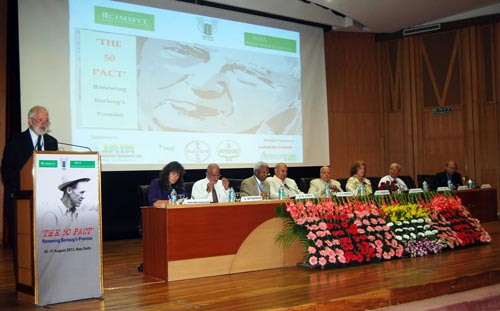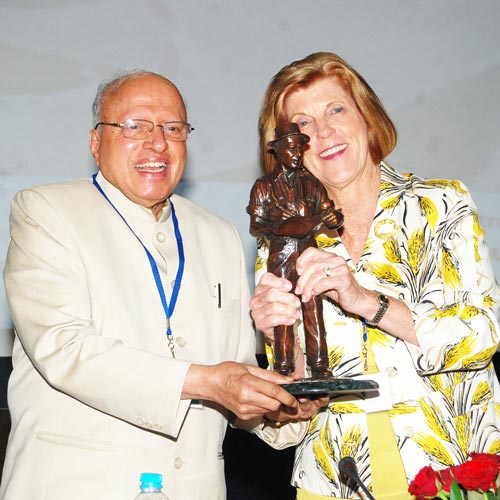 Farmers need to be more involved in developing and refining technology. This was one of the key conclusions of a technology working group comprised of leading Asian scientists, representatives of farmer groups and entrepreneurs who met during “The 50 Pact,” an international conference jointly organized by the Borlaug Institute for South Asia (BISA) and the Indian Council of Agricultural Research (ICAR) to celebrate 50 years of Dr. Norman Borlaug’s first visit to India. Held in New Delhi during 16-17 August, the event brought together more than 200 participants from agriculture institutions, the government, think tanks, industry, and civil society of various countries including Afghanistan, Bangladesh, Belgium, Germany, India, Malaysia, Mexico, Nepal, Sri Lanka, and the United States.
Farmers need to be more involved in developing and refining technology. This was one of the key conclusions of a technology working group comprised of leading Asian scientists, representatives of farmer groups and entrepreneurs who met during “The 50 Pact,” an international conference jointly organized by the Borlaug Institute for South Asia (BISA) and the Indian Council of Agricultural Research (ICAR) to celebrate 50 years of Dr. Norman Borlaug’s first visit to India. Held in New Delhi during 16-17 August, the event brought together more than 200 participants from agriculture institutions, the government, think tanks, industry, and civil society of various countries including Afghanistan, Bangladesh, Belgium, Germany, India, Malaysia, Mexico, Nepal, Sri Lanka, and the United States.
South Asia is the most populous region in the world and several models predict that this region is going to be dramatically impacted by climate change. “We must devise new ways to feed more people with less land, less water and under more difficult climate change conditions,” said Thomas Lumpkin, Director General of CIMMYT, highlighting a significant challenge that requires critical innovations, collaborations and commitments to solve food insecurity and strengthen agriculture in South Asia. This sentiment was echoed by others in the opening session of the conference, including S. Ayyappan, director general of ICAR, government of India, R.S. Paroda, president of Trust for Advancement of Agricultural Sciences (TAAS), R.B. Singh, president of the National Academy of Agricultural Sciences (NAAS), Swapan Datta, ICAR and Marianne Bänzinger of CIMMYT. Remembering their personal interactions with Dr. Borlaug, “the Nobel laureate with a heart for the poor,” and his association with CIMMYT and India, they also felt the need to make a pact to bring about a second green revolution in the South Asia region. M.S. Swaminathan, a legendary figure in Indian agriculture, paid tribute to Dr. Borlaug for his immense contribution in agriculture during the opening ceremony. “From Bengal famine to Right to Food Act of India, it has been a historic transition and Dr. Borlaug played a very important role in this transition through his work in the last 50 years,” Swaminathan said. Jeanie Laube Borlaug, chairperson of BGRI and the daughter of Dr. Norman Borlaug, presented Swaminathan with the Dr. Norman Borlaug Award.
 Technology and innovations will play a key role
Technology and innovations will play a key role
Bangladesh, India, Nepal, and Sri Lanka will have to work together to find regional solutions to food insecurity. Representatives from these countries talked about different agricultural developments during the post-green revolution period and emerging challenges and opportunities. They also highlighted how the BISA, with its mandate, furthers research on farming systems in addition to focusing on an eco-regional approach involving other CG centers. Utilizing all technologies, including molecular breeding, biotechnology, precision agronomy, and mobile-based decision making will be crucial. The session on technology highlighted this and also pushed for greater involvement of farmers at every step of new technology development. It is important to capture the process of adoption of innovation by farmers and use new technology to provide feedback to the researchers. The group advocated for increased political will and a better policy environment on the adoption of GM crops. Making agriculture profitable is important for producers and the entire agricultural value chain. Ramesh Chand of ICAR said that his recent analysis in India shows the real farm income is not declining, but the income gap between agricultural and non-agricultural income is widening. Agricultural infrastructure is not well developed, investments are low and land fragmentation is increasing. These are major concerns for this sector. The participants talked about a need for an enhanced cyber infrastructure for crop research, open access to agriculture database, and strengthening the value chain balancing the role of market, price, and technologies.
Greater regional synergy needed
More emphasis on synergy, partnerships, farmer’s welfare, productivity, profitability, and nutrition will be critical to address the problem of hidden hunger and food security in this region. Other areas to focus on include providing access to and the use of cutting edge research and new technologies that are not yet available in the region, ensuring commitments from governments and other donors for investments in agricultural research, advocating for a policy environment that embraces new technologies and invests in agricultural research, building a regional platform of collaboration with partners from all sectors, research centers, governments, the scientific world, and the farming community who share our mandate to transform farmers’ lives in the region.
 Nutrition, health and food security
Nutrition, health and food security 
